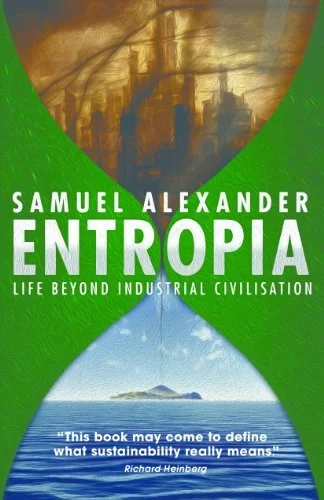Travel Documents 122: Entropia
Genre: sci-fi, near-future, social change, cultural change
The Dust Cover Copy
When industrial civilisation collapsed in the third decade of the 21st century, a community living on a small island in the South Pacific Ocean found itself permanently isolated from the rest of the world. With no option but to build a self-sufficient economy with very limited energy supplies, this community set about creating a simpler way of life that could flourish into the deep future. Determined above all else to transcend the materialistic values of the Old World, they made a commitment to live materially simple lives, convinced that this was the surest path to genuine freedom, peace, and sustainable prosperity. Seven decades later, in the year 2099, this book describes the results of their remarkable living experiment.
The Scene
Worldbuilding
Okay, so, it happens to everyone: some books just rub you the wrong way. This is one that did for me.
The concepts are good. The ideas are good. But the delivery is just. Really. Tedious. Also, it’s pompous. And this is from someone that reads Agatha Christie for fun.
So yeah, I’m owning it as a reviewer: this one got on my nerves. I’ll dig into why below.
So, the worldbuilding. A private island is created with seed money and the basics of civilization, and is designed to evolve into a more sustainable future. Right there, we start with problems. I got really heavy ‘manifest destiny’, and ‘city on a hill’ vibes right from the entire setup. That is not a compliment. The concept of a group putting together an isolated island community to test a social theory is…yeeah. A wee bit cringe. Done right, it could be an intentional community. But this author, in trying to hearken to a style based in British travelogues and personal journals, instead fell right into the kind of ‘righteous community’ rhetoric that makes my brain seethe with images of the worst excesses in classism, eugenics, and paternalistic determinism from the last century. Taking the elect away to a nice paradise island? Eugh. Not a good look.
The author aimed for solarpunk, and fell right down into something uncomfortably close to ecofascist rhetoric.
Now, credit where credit is due: the basic technical ideas are good. Ripping up lawns for food production? Good. Goats instead of cows? Not bad. Circular production? Great. But tech is amoral. And in this case, all the good tech in the world won’t redeem the underlying cultural and social assumptions. And those are worrisome.
The Crowd
Characterization
Honestly? Nil. Zip. Zilch. We don’t find out who is writing this ostensibly personal diary of how Entropia was formed, not as a person. The description of the community is almost Marxist in its absolute absence of actual PEOPLE in his social descriptions. Everything is concepts, ideals, and nice clean anonymous groups. You might as well be in Stepford.
Writing Style
This is a good conceptual book, written in the Wrong Way. It should have been written as a treatise. A how to guide. It would have been a great manual. An illustrated showcase of the island could have worked. But the author chose to write a fiction work, and then couched it as an autobiography of an unknowable narrator who is pontificating on how well their community managed to create itself.
Not cool. The reader feels cheated, bored, and irritated. They signed up for a story. Not a lecture.
If you want to write a guide to setting up a sustainable eco-community, do it. Don’t do this.
The Moves
Plot
The problem with an autobiography told by the kind of professor you hope you don’t get stuck sitting with at dinner is that, by using it as the style, the author has washed hands of all real emotional turmoil. All problems are past tense, pat and solved. Everything is worked out. Everything is neat.
And that is boring, boring, boring. It’s like listening to the above prof pat himself on the back for a career well completed during his retirement speech. And man, don’t you want to slip out the back door while he drones on.
Overall Rating
There’s good basic information in the technical descriptions. But for a read, pick up anything else.





